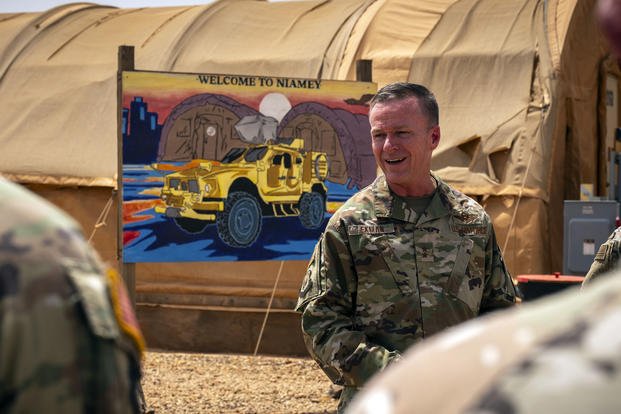
WASHINGTON (AP) — The U.S. will remove all its forces and equipment from a small base in Niger this weekend and fewer than 500 remaining troops will leave a critical drone base in the West African country in August, ahead of a Sept. 15 deadline set in an agreement with the new ruling junta, the American commander there said Friday.
Air Force Maj. Gen. Kenneth Ekman said in an interview that a number of small teams of 10-20 U.S. troops, including special operations forces, have moved to other countries in West Africa. But the bulk of the forces will go to Europe, at least initially.
Niger’s ouster of American troops following a coup last year has broad ramifications for the U.S. because it is forcing troops to abandon the critical drone base that was used for counterterrorism missions in the Sahel, a vast region south of the Sahara desert where groups linked to al-Qaida and the Islamic State group operate.
Ekman and other U.S. military leaders have said other West African nations want to work with the U.S. and may be open to an expanded American presence. He did not detail the locations, but other U.S. officials have pointed to the Ivory Coast and Ghana as examples.
Ekman, who serves as the director for strategy at U.S. Africa Command, is leading the U.S. military withdrawal from the small base at the airport in Niger’s capital of Niamey and from the larger counterterrorism base in the city of Agadez. He said there will be a ceremony Sunday marking the completed pullout from the airport base, then the final 100 troops and the last C-17 transport aircraft will depart.
Under the junta agreement, two-thirds of U.S. troops and equipment must be out of the country by July 26, Ekman said. That deadline, which forced the Pentagon to move quickly, is a key reason why U.S. Africa Command will complete its withdrawal of all 1,000 troops from Niger early.
But it also leaves a counterterrorism gap that U.S. officials are struggling to fill as security threats from extremist groups in the Sahel grow.
One of those groups, Jama’a Nusrat ul-Islam wa al-Muslimin, known as JNIM, is active in Mali, Burkina Faso and Niger and is looking to expand into Benin and Togo. Those expansion locations could be used initially as hubs to rest, recuperate, get financing and gather weapons, according to U.S. officials, but the group also has increased attacks there.
“Niger was immensely helpful for us as a location because it was in the Sahel and it was adjacent to those areas where the threat is most concentrated,” Ekman said. Now, he said, the challenge is battling the insurgency while having to get access from outside Niger, which makes it more difficult.
He said other coastal West African nations are concerned about the Sahel-based threats and want to talk about how they can partner with American forces. Ekman added that the small teams of U.S. troops moving to other West African nations are not combat forces but advisers, as well as special operations, personnel recovery and intelligence and surveillance forces.
Talks with other nations continue, and Ekman said some may be interested but not ready to allow in more U.S. troops. One example, he said, is Togo, which is southwest of Niger on the coast.
“In Togo, what I find is a partner that is friendly to the U.S. but that right now is unresolved on the degree they want the presence of any additional U.S. military personnel there,” he said. “My assessment was, ‘Not yet.’”
Speaking to reporters from The Associated Press and Reuters from the U.S. embassy in Niamey, Ekman said that while portable buildings and vehicles that are no longer useful will be left behind when U.S. troops leave Niger, a lot of larger equipment will be pulled out. For example, he said 18 4,000-pound (1,800-kilograms) generators worth more than $1 million each will be taken out of Agadez.
Unlike the withdrawal from Afghanistan, he said the U.S. is not destroying equipment or facilities as it leaves.
“Our goal in the execution is, leave things in as good a state as possible,” he said. “If we went out and left it a wreck or we went out spitefully, or if we destroyed things as we went, we’d be foreclosing options” for future security relations.
Niger’s ruling junta ordered U.S. forces out of the country in the wake of last July’s ouster of the country’s democratically elected president by mutinous soldiers. French forces had also been asked to leave as the junta turned to the Russian mercenary group Wagner for security assistance.
Washington officially designated the military takeover as a coup in October, triggering U.S. laws restricting the military support and aid.
Ekman said he has been told that there are fewer than 100 Russian troops at the base near in Niamey and that once they are done training Niger troops, they will also leave the country.
© Copyright 2024 Associated Press. All rights reserved. This material may not be published, broadcast, rewritten or redistributed.






